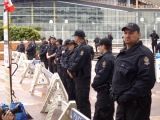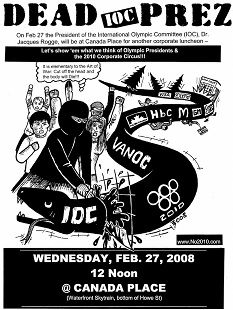Report on Feb 27/08 'Dead IOC Prez' Protest
Report on Feb 27, 2008 'Dead IOC Prez' Protest
Vancouver, Canada [Occupied Coast Salish Territory]-- On Wednesday Feb 27/08 a small protest occurred against the visit of the president of the International Olympic Committee, Dr. Jacques Rogge. The IOC president was in town to check up on VANOC's progress and to promote the Olympics.
At 12 noon approx. 20 protesters gathered outside Canada Place, where Rogge was scheduled to talk at a Vancouver Board of Trade luncheon. A large number of police were deployed in a show of force meant to intimidate protesters, including some 40 visible members of the Crowd Control Unit (CCU), identified by their baseball caps and in some cases body armour, as well as a horse troop of six mounted officers.
While large police deployments are now routine at anti-Olympics protests in Vancouver, this protest also generated media attention due to the provocative poster used to promote it. The poster was headlined 'Dead IOC Prez' with an image of a masked cartoon character decapitating a black snake with 'IOC' stamped on its head. The masked character has a thought balloon that reads: 'It is elementary to the Art of War: Cut off the head and the body will Die!'
Police spokesperson Constable Jana McGuinness defended the large police presence based on the poster: 'There was a poster that was disturbing. That's something we take seriously.'
Meanwhile, the IOC president praised VANOC as a role model and the "first to use the Games as a catalyst for social change," with the "highest environmental standards" and the upliftment of Indigenous peoples.
John Furlong, CEO of VANOC, referring to the small number of protesters, stated: "What's encourging to us is that the number of people protesting the Olympic Games seems to be falling."
The small turn out for the Feb 27 rally is attributed to various factors, including the short organizing time period (1 week), rain on the day of the rally, and that it was the effort of mostly one individual and not a group or coalition.
Corporate media article:
VANOC wins praise for social conscience
IOC boss calls organizers 'a role model' for plans that would benefit native communities and the environment
ROD MICKLEBURGH
The Globe and Mail, February 28, 2008
VANCOUVER -- While 40 riot police stood outside in a solid line to guard against a handful of quiet protesters, International Olympic Committee chief Jacques Rogge yesterday praised Vancouver organizers as the first to use the Games as a catalyst for social change.
'You are a role model and we at the IOC are grateful for that,' Mr. Rogge told a packed ballroom at the city's trade and convention centre.
The head of the IOC referred specifically to Olympic venues meeting 'the highest environmental standards,' the establishment of legacies for native communities, the creation of new opportunities for the disabled and the institution of a procurement policy that enshrines sustainability.
'You have created a unique model for social development,' Mr. Rogge said.
He further praised organizers for measures ensuring the Games' own environmental sustainability, 'a culture of transparency and openness' that has encouraged an astonishing 30,000 people in just two weeks to volunteer for the Games, and efforts to boost the arts, literacy, sports and volunteerism throughout the province.
Vancouver's successful bid for the Games set an Olympic precedent by promising to include not just the environment but the social and economic impact of the Games as part of its commitment to sustainability.
Mr. Rogge did not mention the city's biggest eyesore, the poverty-stricken Downtown Eastside teeming with drug addicts and the mentally disabled, which is almost certain to capture the attention of the world's media during its time here for the Olympics.
Asked whether the head of the IOC, making his first visit to the city since 2005, had seen the Downtown Eastside, VANOC president John Furlong said: 'No, but he will before he leaves.'
Mr. Rogge is scheduled to tour the RONA Fabrication Shop today on the fringe of the devastated area. The plant, which has a contract to supply the 2010 Games with signs and other key items, has hired a number of disadvantaged youths who are being trained in carpentry and then set to work.
Vancouver police, meanwhile, defended their show of force outside the convention centre despite the meagre number of protesters.
Spokeswoman Constable Jana McGuinness said more had been expected to show up.
'There was a poster that was circulated that was disturbing. That's something we take seriously,' she said.
'Our focus is making sure it's a safe place for everyone involved,' Constable McGuinness said.
Mr. Furlong said he doesn't believe such large police contingents will take the shine off the Winter Olympics.
'What we hope will happen is that we will have a celebratory environment by then. Put sport first. I think that's what everybody wants,' he told reporters after Mr. Rogge's speech.
'What's encouraging to us is that the number of people protesting the Olympic Games seems to be falling.'
In his address, the IOC president acknowledged that the Olympics can't solve all the world's problems or address all the social challenges faced by a host city.
But sport can act as an agent of change. Hosting the Olympics is a 'once-in-a-lifetime chance to showcase the celebration of environmental and social legacies that can change a community and its citizens forever,' Mr. Rogge said.
Perhaps surprisingly, he mentioned Beijing, host of this year's Summer Olympics, as a prime example.
Critics have lambasted the IOC for ignoring ongoing human-rights abuses in Communist-ruled China and the host city's worsening pollution.
The Olympic committee head has warned that some events may have to be moved out of Beijing if the smog is too thick.
But he insisted yesterday that the Olympics have raised environmental awareness in China, praising the country for improving water quality for tens of million of people, changing from coal to gas for energy in its factories, and planting millions of trees between the Gobi Desert and Beijing to curtail sandstorms.
China is also removing 'polluting cars' from the country's roads and plans to reduce Beijing's clogged traffic by 1.3 million vehicles during the Olympics, he added.
'I think this is going to have good results, not only in August, but for decades to come.'
As for Vancouver, Mr. Rogge predicted the city will stage a 'spectacular and extraordinary Olympic and Paralympic Games' that will inspire millions of people around the world 'with the spirit of Olympianism that is so evident here.'

